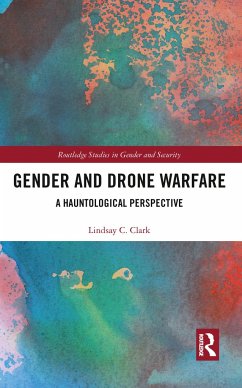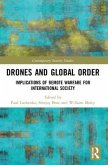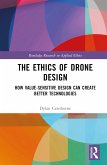This book investigates how drone warfare is deeply gendered and how this can be explored through the methodological framework of 'Haunting'.
Utilising original interview data from British Reaper drone crews, the book analyses the way killing by drones complicates traditional understandings of masculinity and femininity in warfare. As their role does not include physical risk, drone crews have been critiqued for failing to meet the masculine requirements necessary to be considered 'warriors' and have been derided for feminising war. However, this book argues that drone warfare, and the experiences of the crews, exceeds the traditional masculine/feminine binary and suggests a new approach to explore this issue. The framework of Haunting presented here draws on the insights of Jacques Derrida, Avery Gordon, and others to highlight four key themes - complex personhood, in/(hyper)visibility, disturbed temporality and power - as frames through which the intersection of gender and drone warfare can be examined. This book argues that Haunting provides a framework for both revealing and destabilising gendered binaries of use for feminist security studies and International Relations scholars, as well as shedding light on British drone warfare.
This book will be of interest to students of gender studies, sociology, war studies, and critical security studies.
Utilising original interview data from British Reaper drone crews, the book analyses the way killing by drones complicates traditional understandings of masculinity and femininity in warfare. As their role does not include physical risk, drone crews have been critiqued for failing to meet the masculine requirements necessary to be considered 'warriors' and have been derided for feminising war. However, this book argues that drone warfare, and the experiences of the crews, exceeds the traditional masculine/feminine binary and suggests a new approach to explore this issue. The framework of Haunting presented here draws on the insights of Jacques Derrida, Avery Gordon, and others to highlight four key themes - complex personhood, in/(hyper)visibility, disturbed temporality and power - as frames through which the intersection of gender and drone warfare can be examined. This book argues that Haunting provides a framework for both revealing and destabilising gendered binaries of use for feminist security studies and International Relations scholars, as well as shedding light on British drone warfare.
This book will be of interest to students of gender studies, sociology, war studies, and critical security studies.
'Drone technology is not only shaping the nature of warfare but also the perceived nature of the soldier, as Clark [...] explores in this book. Being distant from the battlefield, drone pilots are not in immediate physical danger, which has the perceived effect of feminizing their warrior status. However, by combining the methodology of "haunting" (drawing on Jacques Derrida's notion of "hauntology": paying attention to unseen spaces, non-linearity, and intuitions) with Cynthia Weber's queer logics, Clark argues that the pilot's experiences actually exceed the masculine/feminine binary and disrupt traditional gendered understandings of warfare. Clark clearly lays out the applicability of both methodological frameworks, illustrating each with narrative examples. Hauntology, for instance, "discomforts" the interwoven binaries surrounding issues of complex personhood, ruptured and distorted temporalities, power, and in/(hyper)visibility. Queer logic, meanwhile, allows for the coexistence of opposing "sides," such as the drone pilot being simultaneously present and far from the battlefield. A solid contribution to the "Routledge Studies in Gender and Security" series, this text provides a novel theoretical model with larger implications for feminist security studies. umming Up: Recommended. Graduate students and faculty.'--S. J. Shaw, Antioch University, CHOICE








